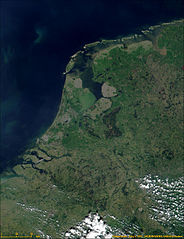The Economist reports in a recent article Overflow on how Dutch politics are changing due to increased worries about immigration from eastern Europe. The Economist describes clearly but also clinically what is going on in the Netherlands with the rise of immigration, without regarding the longer term consequences of a questionable EU policy for the future of a welfare state carefully built up over the last century. It says:
"After a year of recession, with unemployment rising past 7%, the Dutch
are increasingly resentful of immigration and of the European Union’s
rules that make it unavoidable. Last week the vice-prime minister,
Lodewijk Asscher, tapped the resentment. In a newspaper opinion piece (i.e in the British The Independent and also in the Dutch De Volkskrant)
co-written with David Goodhart, a British pundit, Mr Asscher likened
rising migration to a “Code Orange”, Dutch parlance for a severe flood
warning. “In some places,” he wrote, “the dykes are on the point of
breaking.....
Mr Asscher represents the Labour Party half of the Netherlands’ centrist
coalition, led by the Liberal prime minister, Mark Rutte. Both parties
are threatened by anti-immigration rivals: the Liberals have been
leaking voters to the far-right Freedom Party of Geert Wilders, while
Labour has lost even more support to the far-left Socialists. Under EU
rules, work-permit requirements for Bulgarian and Romanian citizens are
due to expire on January 1st, and Labour is worried that an influx of
new immigrants would expose it to attack......
The number of people from
formerly communist EU member states living in the Netherlands is still
small, for a country of 17m, but it has shot up since the EU enlarged in
2004 (from 0.4% to 1.2% of the Dutch labor force).........
For the (right wing) Freedom Party and the (left wing) Socialists, meanwhile, Mr Asscher’s
approach (of being more strict with the Dutch employers who offer lower wages to the eastern European immigrants) is a useless halfway measure. They want a return to a strict
regime of work permits to keep low-wage workers out—even if it means
flouting EU rules."
The Economist concludes then:
"At the core of the growing Dutch anxiety are abstract arguments, not
practical ones. The Netherlands is a small, wealthy country with
generous social welfare, where wages and benefits have traditionally
been settled in national bargains between employers, workers and
government....It
has struggled to absorb previous waves of immigration. Now the EU has
opened a channel between that orderly and pampered world and a labour
supply which is used to far worse pay and conditions. Dutch workers are
trying to imagine just what it would take for those levels to equalise."
Whether The Economist thinks the Dutch worries are not practical is irrelevant, the consequences of the EU policies are obvious as described by the Dutch minister Asscher and also becoming evident in recent polling numbers: currently the Dutch government coalition (consisting of the Liberal party - i.e. the free-market VVD - and the Labour party - i.e. the PVDA -) has a majority of 79 seats in the 150 seat Dutch parliament. According to a recent poll conducted by leading Dutch pollster Maurice de Hond, the Liberal Party would lose 20 seats ending up with 21 seats and the Labour Party would lose 25 seats ending up with 13 seats:i.e. they would have only a total of 38 seats, losing their majority in an unprecedented manner. On the other hand the (rightwing) Freedom Party would gain 15 seats ending up with 30 seats, while the (leftwing) Socialists would gain 9 seats ending up with 24 seats, together 54 seats. Not a majority - and it would seem inconceivable for those two parties to work together - but in any case an incredible jump. According to de Hond the changes are due to especially lower educated voters switching to these two populist parties.
Clearly, The Economist is ignoring the bigger issue of the weakening of the Dutch (and other
European) welfare states, and their citizens' anxieties. The policy of allowing the EU rules of free movement of people to be applied equally to countries with a total different economic background and make-up is another
example of a foolish EU policy, whose full consequences we will be witnessing soon, whether at the next Dutch elections or in increased anxiety and frustration among Dutch workers.
For more background on immigration, and the Dutch and UK economies and politics, see my previous posts: OECD Finds Immigration No Burden on Public Finances of June 20, 2013; The Deteriorating Dutch Economy and the Euro of August 6, 2013 and The Economic & Political Tale of Two Countries: Holland & the UK of August 15, 2013.
See also a debate between David Goodhart, director of British thinktank Demos and author of The British Dream. Successes and Failures of Post-war Immigration with the Dutch vice-prime minister Lodewijk Asscher recently held in the Balie in Amsterdam.

No comments:
Post a Comment